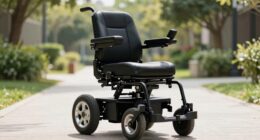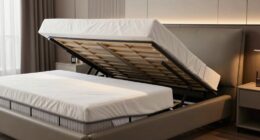In the world of caring for people with dementia, there is a well-known saying that states, “Comfort is a priceless treasure.”
When it comes to the well-being of individuals with dementia, the use of weighted blankets has been gaining attention for its potential benefits. These blankets have shown promise in improving various aspects of daily life for dementia patients, offering a sense of calm and security.
But how exactly can a simple blanket make such a difference? Let's explore the unique ways in which weighted blankets are enhancing the lives of those with dementia.
Key Takeaways
- Weighted blankets improve sleep quality and reduce anxiety in dementia patients.
- Deep pressure stimulation aids in regulating the nervous system for well-being.
- Personalized care plans using weighted blankets enhance comfort and relaxation.
- Non-pharmacological approach with weighted blankets provides effective relief from agitation.
The Science of Weighted Blankets for Dementia
Weighted blankets for dementia patients offer a scientifically-backed approach to promoting relaxation and improving mood through deep pressure stimulation. The science behind weighted blankets lies in their ability to provide deep pressure therapy, which can help regulate the nervous system in individuals with dementia. By applying gentle pressure evenly across the body, these blankets stimulate the release of serotonin, a neurotransmitter that contributes to feelings of well-being and happiness. Additionally, the deep pressure can enhance melatonin production, aiding in the regulation of sleep-wake cycles and promoting better rest for dementia patients.
Research suggests that using weighted blankets weighing around 10% of the individual's body weight can lead to optimal therapeutic benefits. This weight mimics the sensation of a comforting hug, creating a sense of security and calmness. By reducing anxiety levels and promoting relaxation, weighted blankets play a crucial role in improving the overall well-being of individuals with dementia.
Benefits of Weighted Blankets for Sleep

Having explored the science behind weighted blankets for dementia patients, we now turn our focus to the tangible benefits these blankets offer for improving sleep quality in individuals with dementia.
Weighted blankets designed for Alzheimer's and dementia patients can significantly improve sleep quality, reduce anxiety, and promote a calming effect, leading to a better overall quality of life. Here are three key benefits of using weighted blankets for sleep:
- Improve Sleep Quality: Weighted blankets help individuals with dementia sleep better by providing deep touch pressure stimulation, resulting in reduced restlessness and enhanced relaxation.
- Reduce Anxiety: The gentle pressure from the weighted blanket can reduce anxiety levels, promoting a sense of security and comfort that aids in falling asleep faster and staying asleep longer.
- Deep Sleep: By mimicking the feeling of a comforting hug, weighted blankets facilitate deep sleep, leading to a more restful and rejuvenating night's rest for individuals with dementia.
Deep Pressure Stimulation and Dementia Care
Utilizing deep pressure stimulation techniques enhances the quality of care provided to individuals with dementia, fostering a sense of calmness and comfort in their daily experiences. Deep pressure stimulation, often delivered through weighted blankets, has shown remarkable benefits for dementia patients. The gentle, consistent pressure exerted by these blankets mimics the feeling of a soothing embrace, effectively reducing agitation and anxiety. Research indicates that this form of sensory feedback can boost serotonin production, aiding in regulating the nervous system of individuals with dementia. By opting for a non-pharmacological approach like weighted blankets, caregivers can address symptoms such as sleep disturbances and enhance the overall quality of life for those under their care. The use of deep pressure stimulation techniques not only promotes relaxation but also provides a compassionate way to improve the well-being of dementia patients.
| Benefits of Deep Pressure Stimulation |
|---|
| Calms Agitation |
| Reduces Anxiety |
| Enhances Comfort |
| Improves Sleep Quality |
| Boosts Serotonin Production |
Weighted Blankets for Anxiety Relief

In our experience working with individuals with dementia, we've found that weighted blankets play a crucial role in providing relief from anxiety. These blankets have proven to be effective in reducing anxiety levels and promoting calmness in dementia patients through deep touch pressure stimulation.
Here are three key benefits of using weighted blankets for anxiety relief in dementia care:
- Decrease in Agitated Behavior: Studies indicate that the use of weighted blankets can lead to a noticeable decrease in agitated behavior among individuals with dementia.
- Promotion of Calmness: The gentle pressure from a weighted blanket mimics the sensation of a hug, helping to alleviate anxiety and promote a sense of relaxation for dementia patients.
- Non-Pharmacological Approach: Weighted blankets offer a non-pharmacological approach to anxiety relief, enhancing the overall well-being and quality of life for individuals with dementia by providing sensory feedback and reducing sensory overload.
Personalized Approach to Dementia Care
Our approach to dementia care always centers around tailoring interventions to suit the unique and individualized needs of each patient. By creating individualized care plans that consider specific symptoms, preferences, and challenges, we can provide tailored interventions aimed at enhancing well-being, managing symptoms, and improving the overall quality of life for dementia patients. This personalized care approach promotes a person-centered approach to dementia management, focusing on the individual and their specific requirements.
| Personalized Approach to Dementia Care |
|---|
| Tailoring Interventions |
| Individualized Care Plans |
| Holistic Care Plan |
In our experience, a personalized approach to dementia care involves a detailed understanding of each patient's unique needs. By incorporating customized strategies and holistic care plans, we can create a compassionate and effective framework for managing dementia symptoms and enhancing the well-being of those under our care.
Frequently Asked Questions
What Are 3 Things to Never Do With Your Loved One With Dementia?
When caring for a loved one with dementia, we must remember to avoid arguments, always ensure their safety, and refrain from rushing them. These actions can lead to frustration, confusion, and anxiety in our loved ones.
It's crucial to approach situations with patience and understanding, providing a safe and supportive environment for their well-being. By practicing empathy and patience, we can create a more positive and comforting experience for our loved ones with dementia.
What Is the Number One Trigger for Dementia Behavior?
Changes in routine or environment are the primary trigger for dementia behavior. Sudden alterations in daily habits or surroundings can lead to increased confusion and agitation in patients. Consistency and familiarity are crucial in reducing behavioral issues.
Environmental changes like moving or rearranging can be particularly disruptive. Understanding and minimizing triggers related to changes can help manage and prevent challenging behaviors in those with dementia.
At What Stage of Dementia Should You Not Live Alone?
When dementia progresses to its later stages, it becomes unsafe to live alone. Safety concerns increase due to memory loss, cognitive decline, and behavioral changes.
Supervision and support from caregivers or specialized facilities are crucial. As dementia advances, daily tasks become challenging and accidents more likely.
Living alone in mid to late-stage dementia poses risks that require constant monitoring and assistance for the well-being and safety of individuals.
How Long Does Stage 7 Dementia Last?
Stage 7 dementia, the late stage, can vary in duration from weeks to years, depending on individual circumstances. This phase signifies a profound decline in cognitive and physical abilities, often necessitating full-time care.
Factors like overall health and quality of support influence the duration. During this stage, individuals experience severe cognitive impairment, loss of speech, mobility challenges, and heightened susceptibility to infections, warranting end-of-life considerations.
Conclusion
In conclusion, weighted blankets have shown remarkable benefits for individuals with dementia, improving their overall well-being and quality of life.
One example is Sarah, a dementia patient who experienced reduced anxiety and improved sleep after using a weighted blanket.
By incorporating weighted blankets into dementia care, we can provide comfort, security, and relaxation for our loved ones living with this condition.
Remember, small changes like using a weighted blanket can make a big difference in their daily lives.









